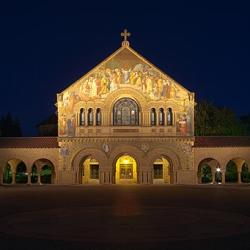Lectionary Reflections
Matthew 5:13-20
February 9, 2014
Every spring at Perkins School of Theology students hold an "April Follies." It's an evening of comedic skits put on by various students and faculty. Casting my mind back over past years, I recall the segment where a seminary student interviewed undergraduates to test their theological and biblical knowledge with such questions as "What is exegesis? Answer: A skin treatment to slough off dead skin cells." And "Who is St. Augustine? Answer: A city in Florida." I remember the year that three of my colleagues dressed as John Wesley, Martin Luther, and John Calvin and conducted a ridiculous, hilarious theological squabble.
I also remember skits caricaturing the mannerisms of individual faculty members. A few years ago, knowing my turn was coming, as a sort of preemptive measure, I offered to put together a skit. I figured I would make fun of myself before someone else beat me to the punch. I gathered a group of students who agreed to play my preaching class with one male student who had long flowing hair, agreeing to play Jesus.
The skit was based on my teaching method in my introductory preaching classes. In the feedback sessions I talk first about the "strengths" of a student's message. We then move on to lift up "strengtheners." The goal is to help the preacher accept constructive feedback offered in a non-threatening manner. So in my skit "Jesus" preached a portion of the Sermon on the Mount (Mt. 5:13-20) to my class seated in a horseshoe formation of folding chairs. I then stood up and with my back to the group, began writing on the whiteboard while offering this critique: "Now, Jesus, let's talk first about strengths of the message. You used some good, down-to-earth imagery: salt and light. I would encourage you to continue that in your future preaching. But (I continued speaking with my back to the group, writing on the whiteboard) you remember we learned earlier in the semester that every sermon needs to have one single focus and you are all over the map with this one -- salt, light, not coming to abolish the prophets, breaking and keeping commandments. It seems almost like you put a bunch of short sayings together in a row. And one more thing -- your final sentence: 'Unless your righteousness exceeds that of the scribes and Pharisees, you will never enter the kingdom of heaven.' Where is the good news in this sermon ending? It sets out an impossible goal and then tells listeners they'll be in trouble if they can't do the impossible."
While I was speaking, unbeknownst to me, "Jesus" shook his head, rolled his eyes, stood up, and signaled to the group to follow him out. When I turned around, my classroom was empty.
Theologian Karl Barth once referred to preaching as "the impossible possibility," by which he meant that for a human being to speak words of divine significance was impossible by human means alone but possible with God's presence and power.
In my critique of Jesus' sermon in my skit, I took on the interpretation that many people have with regard to the Sermon on the Mount, that it is an impossible impossibility. Dale Allison, in his book The Sermon on the Mount: Inspiring the Moral Imagination, points out that throughout history various groups have interpreted the Sermon in this way. The Roman Catholic or monastic interpretation was that the high ethical standards of the Sermon could only be fulfilled by monks and ascetics, not by everyday run of the mill Christians. (Allison, 21) Later, Luther's view was that the Sermon sets out an impossible ideal in order to show us our inability to fulfill the law and to throw us back onto the mercies of God.
Allison helpfully points out that these interpretations ignore the context of the Gospel of Matthew in which the Sermon is found. To understand Matthew 5-7, we need Matthew 1-4 and Matthew 8-28. Read in context we can't support the monastic interpretation, for we find that the Sermon is a call to repent, not just for some, but for all. The Sermon is a general summary of Jesus' moral demands on all of Israel. It is clearly for the crowd and not just the disciples. (Allison, 4)
Nor can we reduce the Sermon to an impossibly high standard meant to rub our noses in our human weakness, a theological lesson in the need for grace. For the Sermon is meant to be lived out and Jesus' gracious presence threads throughout the book of Matthew to help us in that endeavor. The demands of the Sermon are accompanied by the helping presence of Jesus. "For where two or three are gathered in my name, I am there among them" (18:20). "And remember I am with you always, to the end of the age" (28:20).
Matthew 5:20 is not a call to impossible ethical heights. Our righteousness is to exceed that of the scribes and Pharisees because their practices had become external and perfunctory, cut off from the radical love of neighbor and God that is at the heart of Judaism. The Pharisees were concerned to preserve the distinctiveness of Judaism and had numerous interpretations of Torah concerning ritual cleanliness, dietary habits, and Sabbath activities. These were designed to be constant reminders of God's faithfulness amid the details of daily life. In practice they could become substitutes for inward obedience.





